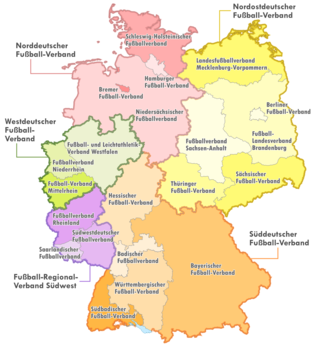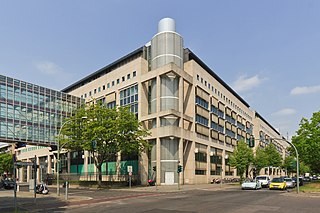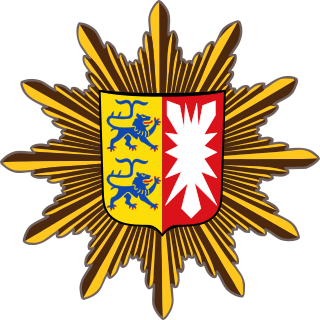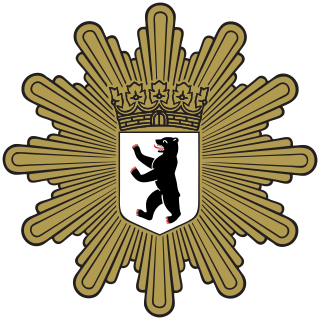
The Oberliga is the fifth tier of the German football league system. Before the introduction of the 3. Liga in 2008, it was the fourth tier. At the end of the 2011–12 season the number of Oberligas was increased from eleven to fourteen.

Landespolizei is a term used to refer to the state police of any of the states of Germany.

Municipalities are the lowest level of official territorial division in Germany. This can be the second, third, fourth or fifth level of territorial division, depending on the status of the municipality and the Land it is part of. The city-states Berlin and Hamburg are second-level divisions. A Gemeinde is one level lower in those states which also include Regierungsbezirke as an intermediate territorial division. The Gemeinde is one level higher if it is not part of a Gemeindeverband.
Spezialeinsatzkommando are police tactical units of each of the 16 German State Police forces. Along with the Mobiles Einsatzkommando (MEK), Personenschutzkommando (bodyguards), and the Verhandlungsgruppe, they are part of the police Spezialeinheiten of each state.

Norddeutscher Rundfunk, commonly shortened to NDR, is a public radio and television broadcaster, based in Hamburg. In addition to the city-state of Hamburg, NDR broadcasts for the German states of Lower Saxony, Mecklenburg-Vorpommern and Schleswig-Holstein. NDR is a member of the ARD organisation.
The German football league system, or league pyramid, refers to the hierarchically interconnected league system for association football in Germany that in the 2016–17 season consisted of 2,235 leagues in up to 13 levels having 31,645 teams, in which all divisions are bound together by the principle of promotion and relegation. The top three professional levels contain one division each. Below this, the semi-professional and amateur levels have progressively more parallel divisions, which each cover progressively smaller geographic areas. Teams that finish at the top of their division at the end of each season can rise higher in the pyramid, while those that finish at the bottom find themselves sinking further down. Therefore, in theory, it is possible for even the lowest local amateur club to rise to the top of the system and become German football champions one day. The number of teams promoted and relegated between the divisions varies, and promotion to the upper levels of the pyramid is usually contingent on meeting additional criteria, especially concerning appropriate facilities and finances.

The State Criminal Police Office, or Landeskriminalamt (LKA) in German, is an independent law enforcement agency in all 16 German states that is directly subordinate to the state's ministry of the interior.

The North Rhine-Westphalia (NRW) State Police Force is the largest of the 16 German state police forces with around 50,000 personnel.
The Verbandsliga is usually a tier-six football league in the German football league system, covering the area of a Bundesland or a regional part of such Bundesland.

Schleswig-Holstein Police is a state law-enforcement agency in Schleswig-Holstein, Germany. It is subordinated to the Schleswig-Holstein Ministry of the Interior, Municipal Affairs, Housing and Sports.
Germany's federal system comprises 16 state parliaments, each including directly elected representatives.

The Hamburg Police is the German Landespolizei force for the city-state of Hamburg. Law enforcement in Germany is divided between federal and state (Land) agencies. A precursor to the agency, the Polizei-Behörde, has existed since 1814.

The Berlin Police is the Landespolizei force for the city-state of Berlin, Germany. Law enforcement in Germany is divided between federal and state (Land) agencies.

The Schutzpolizei des Reiches or the Schupo was the state protection police of Nazi Germany and a branch of the Ordnungspolizei. Schutzpolizei is the German name for a uniformed police force. The Schutzpolizei des Reiches was the uniformed police of most cities and large towns. State police departments were in charge of protection police, Kripo criminal investigation divisions (Kriminalpolizei), and administrative police. The state protection police comprised a patrol branch, barracked police, traffic police, water police, mounted police, police communications units, and police aviation. Policemen were required to have previous military service, good physical and mental health, Aryan descent and membership in the Nazi Party.

The Bundesvision Song Contest 2005 was the first edition of the annual Bundesvision Song Contest musical event. The contest was held on 12 February 2005 at the König Pilsener Arena in Oberhausen, North Rhine-Westphalia. The contest was hosted by Stefan Raab, Annette Frier, and Oliver Pocher in the green room. It was the first Germany-wide music competition in this format.

The Bremen State Police is the state police force of the Free Hanseatic City of Bremen. It employs around 2,500 officers. The agency is headed by police chief Dirk Fasse; the political head is the Senator for the Interior Ulrich Mäurer.

The list of German municipal flags lists the flags of municipalities of Germany. Most municipalities of Germany have unique flags. Like state flags, most of them are with either a bicolor or tricolor stipes with or without the emblem ("wappen"). Therefore, the list will also discuss the emblems. Please note that some of the flags listed are de facto flags.



















